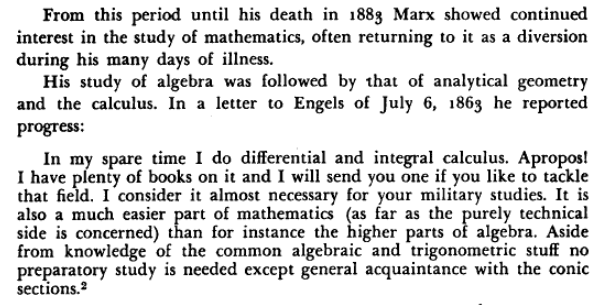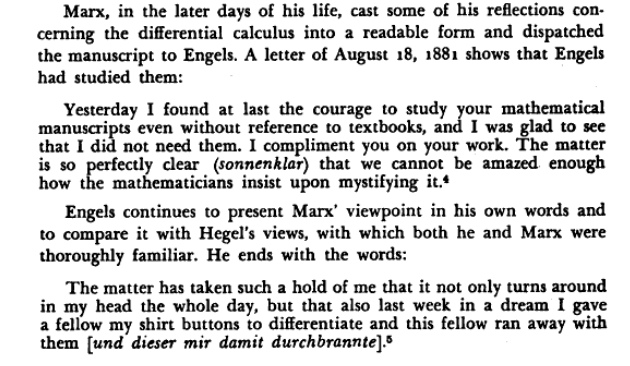Jan 31, is the birth date of Sofya Yanovskaya, who was Professor of Mathematics at Moscow State University. She received the prized Order of Lenin in 1951 and in 1959 she became the first chairperson of the newly created department of mathematical logic at Moscow State University. Wikipedia describes her as, "a mathematician and historian, specializing in the history of mathematics, mathematical logic, and philosophy of mathematics. She is best known for her efforts of restoring mathematical logic research in the USSR and publishing and editing mathematical works of Karl Marx." [emphasis added].
Go on, admit it, you didn't know Karl Marx did math did you... yeah, me neither. But it seems his math impacted on the study of math in China much later, and even has an effect on math study there today.
Here is the impact as described by Joseph W. Dauben
Title: Marx, Mao and Mathematics: The Politics of Infinitesimals
The ``Mathematical Manuscripts'' of Karl Marx were first published (in part) in Russian in 1933, along with an analysis by S.~A. Yanovskaya. Friedrich Engels was the first to call attention to the existence of these manuscripts in the preface to his Anti-D\"uhring [1885]. A more definitive edition of the ``Manuscripts'' was eventually published, under the direction of Yanovskaya, in 1968, and subsequently numerous translations have also appeared. Marx was interested in mathematics primarily because of its relation to his ideas on political economy, but he also saw the idea of variable magnitude as directly related to dialectical processes in nature. He regarded questions about the foundations of the differential calculus as a ``touchstone of the application of the method of materialist dialectics to mathematics.'' Nearly a century later, Chinese mathematicians explicitly linked Marxist ideology and the foundations of mathematics through a new program interpreting calculus in terms of nonstandard analysis. During the Cultural Revolution (1966--1976), mathematics was suspect for being too abstract, aloof from the concerns of the common man and the struggle to meet the basic needs of daily life in a still largely agrarian society. But during the Cultural Revolution, when Chinese mathematicians discovered the mathematical manuscripts of Karl Marx, these seemed to offer fresh grounds for justifying abstract mathematics, especially concern for foundations and critical evaluation of the calculus. At least one study group in the Department of Mathematics at Chekiang Teachers College issued its own account of ``The Brilliant Victory of Dialectics - Notes on Studying Marx's `Mathematical Manuscripts'.'' Inspired by nonstandard analysis, introduced by Abraham Robinson only a few years previously, some Chinese mathematicians adapted the model Marx had laid down a century earlier in analyzing the calculus, and especially the nature of infinitesimals in mathematics, from a Marxist perspective. But they did so with new technical tools available thanks to Robinson but unknown to Marx when he began to study the calculus in the 1860s. As a result, considerable interest in nonstandard analysis has developed subsequently in China, and almost immediately after the Cultural Revolution was officially over in 1976, the first all-China conference on nonstandard analysis was held in Xinxiang, Henan Province, in 1978.
In a JSROR article by Dirk J Struik in 1948 I found this:
and this



No comments:
Post a Comment